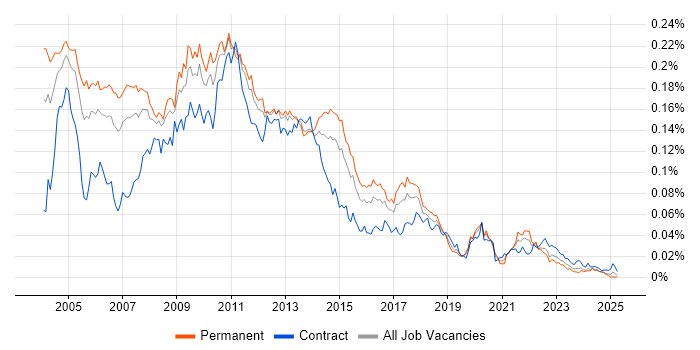Oracle OLAP
UK
The table below provides summary statistics for permanent job vacancies requiring Oracle OLAP skills. It includes a benchmarking guide to the annual salaries offered in vacancies that cited Oracle OLAP over the 6 months leading up to 17 May 2025, comparing them to the same period in the previous two years.
| 6 months to 17 May 2025 |
Same period 2024 | Same period 2023 | |
|---|---|---|---|
| Rank | - | 889 | 957 |
| Rank change year-on-year | - | +68 | +216 |
| Permanent jobs citing Oracle OLAP | 0 | 10 | 13 |
| As % of all permanent jobs advertised in the UK | - | 0.010% | 0.013% |
| As % of the Database & Business Intelligence category | - | 0.055% | 0.061% |
| Number of salaries quoted | 0 | 4 | 9 |
| 10th Percentile | - | - | £47,500 |
| 25th Percentile | - | £58,750 | £67,500 |
| Median annual salary (50th Percentile) | - | £71,250 | £80,000 |
| Median % change year-on-year | - | -10.94% | +9.59% |
| 75th Percentile | - | £86,125 | - |
| 90th Percentile | - | £92,650 | - |
| UK excluding London median annual salary | - | £71,250 | - |
All Database and Business Intelligence Skills
UK
Oracle OLAP falls under the Databases and Business Intelligence category. For comparison with the information above, the following table provides summary statistics for all permanent job vacancies requiring database or business intelligence skills.
| Permanent vacancies with a requirement for database or business intelligence skills | 7,697 | 18,259 | 21,310 |
| As % of all permanent jobs advertised in the UK | 13.79% | 18.32% | 21.40% |
| Number of salaries quoted | 5,044 | 12,535 | 13,278 |
| 10th Percentile | £36,250 | £35,000 | £37,500 |
| 25th Percentile | £47,500 | £42,725 | £47,500 |
| Median annual salary (50th Percentile) | £62,500 | £57,500 | £65,000 |
| Median % change year-on-year | +8.70% | -11.54% | +8.33% |
| 75th Percentile | £83,750 | £76,250 | £83,750 |
| 90th Percentile | £115,000 | £96,539 | £102,800 |
| UK excluding London median annual salary | £55,000 | £52,500 | £55,000 |
| % change year-on-year | +4.76% | -4.55% | +4.76% |
Oracle OLAP
Job Vacancy Trend
Job postings citing Oracle OLAP as a proportion of all IT jobs advertised.

Oracle OLAP
Salary Trend
3-month moving average salary quoted in jobs citing Oracle OLAP.
